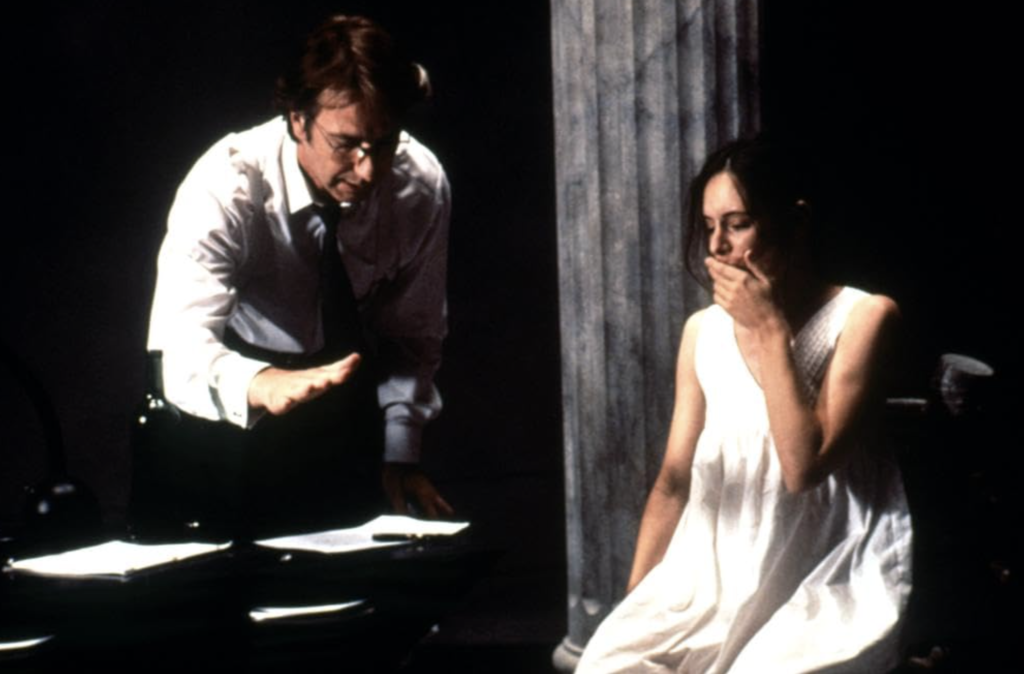You’ve probably never heard of Closet Land, nor of its writer-director Radha Bharadwaj. You probably have heard of composer Richard Einhorn, cinematographer Bill Pope, and designer Eiko Ishioka, who all contributed to Closet Land. You no doubt know Madeleine Stowe and Alan Rickman, the stars of the film. You may also know Martin McDonagh, whose play The Pillowman was inspired by this film.
How can a movie have such a pedigree and be consigned to such obscurity? First, it’s a movie about a political prisoner being tortured. Not exactly a popcorn movie. Second, it takes place in a single room, mostly in real time. Third, it was a small, low-budget production without wide theatrical release. I wouldn’t have seen it but for a Saturday afternoon arthouse series the Byrd movie theatre ran. It’s where I saw the Mongolian feature The Horse Thief and the artsy Rosencrantz and Guildenstern are Dead, another movie made by a highly acclaimed cast and crew that went down in critical and commercial flames.
Closet Land was also savaged by critics, and it may have been the victim of the most unfair opprobrium I’ve ever seen heaped on a film. Roger Ebert hated it. Janet Maslin hated it. Peter Travers hated it. The main reason for the scorn had little to do with the film itself, but with its presumed aim of calling attention to the circumstances of political prisoners worldwide. Kevin Thomas wrote in the Los Angeles Times: “It is impossible to imagine how Radha Bharadwaj’s Closet Land is going to do much good for the cause of human rights in general, and the oppression of women in particular.” Roger Ebert wrote he was “offended by the smugness of this film.” Worse still was the Village Voice review. I can’t find it online, but I remember the reviewer sarcastically complimented Ron Howard and Brian Grazer’s Imagine Entertainment, assuming they too were smug—about producing the first film by a woman of color made by a major Hollywood company.
Amnesty International did consult on the movie, so perhaps they inadvertently tainted it, although I never heard anyone complain about U2’s association with them. Maslin called the writing poor. How, then, did the script win the Academy’s prestigious Nicholl Fellowship? Something else was going on. Whatever it was, it sabotaged the career of a real talent.
Radha Bharadwaj’s film opens with Madeleine Stowe’s unnamed prisoner awakening in a baroque prison. Ishioka’s set design incorporates Roman columns and postmodern shapes, making the space distinctly un-prisonlike. The table, an inverted obsidian pyramid, has its own personality. It’s a desk, a torture bed, and in one moment, a disorienting top that spins to confuse and unsettle the Prisoner, who doesn’t know why she is there. She is not a subversive, a revolutionary, or an insurrectionist. Then again, neither was Solzhenitsyn.
On the other side of the table is Alan Rickman’s nameless interrogator, who like every good torturer wavers between compassion and sadism. Rickman, fresh off Die Hard and Robin Hood: Prince of Thieves, is perhaps a bit too villainous. But he shows the range which distinguished him in later roles. When he claims “they’re watching me, too,” we’re unsure if it’s part of his game or if he’s genuinely afraid. He reveals Stowe’s character is there because of a children’s book she wrote. The book Closet Land is about a girl locked in a closet as punishment. While in her closet, the girl imagines storybook friends to console her. The book, the Interrogator claims, is an allegory for the oppression of the unnamed authoritarian government. It then comes out that Stowe’s character was sexually abused in a closet, and that this book is really about her. Any resemblance to this government is coincidental.
So begins the verbal and psychological cat and mouse game. The writing, contra Maslin, is sharp and on point. The action varies enough so while Closet Land does evoke a stage play, it never devolves into monologues. And at one point, Bharadwaj uses a device rarely seen in modern cinema. She cuts in archival photos of children, then turns our interpretations of these photos upside down by zooming out and showing their settings—Nazi Germany, a Klan rally, a terrorist camp. These photos have no narrative connection to the story. They are what Sergei Eisenstein called “intellectual montage.” Closet Land was the first time I’d seen this technique used in a contemporary film. I still can only think of one other intellectual montage in a mainstream narrative movie produced during the sound era. Of course, this movie does not end happily. There is no rescue or reprieve, but that’s not the endgame, is it? The interrogator wants submission and prisoner wants her dignity. This is not a message movie aiming to end political violence, any more than Room intends to stem the tide of domestic violence.
Bill Pope would go on to shoot the Matrix movies, Eiko Ishioka would go on to work with Coppola and Tarsem, and Martin McDonagh would win acclaim for The Banshees of Inisherin. Writer-director Radha Bharadwaj would struggle to get other projects off the ground, in part due to the lashings Closet Land received. See it for what it is and you’ll see a riveting drama, a roundly drawn battle of wills, and yes, perhaps a multi-level statement on the connection between state and patriarchy. But don’t assume the filmmakers felt self-congratulatory in their statement. That would be highly unfair.

